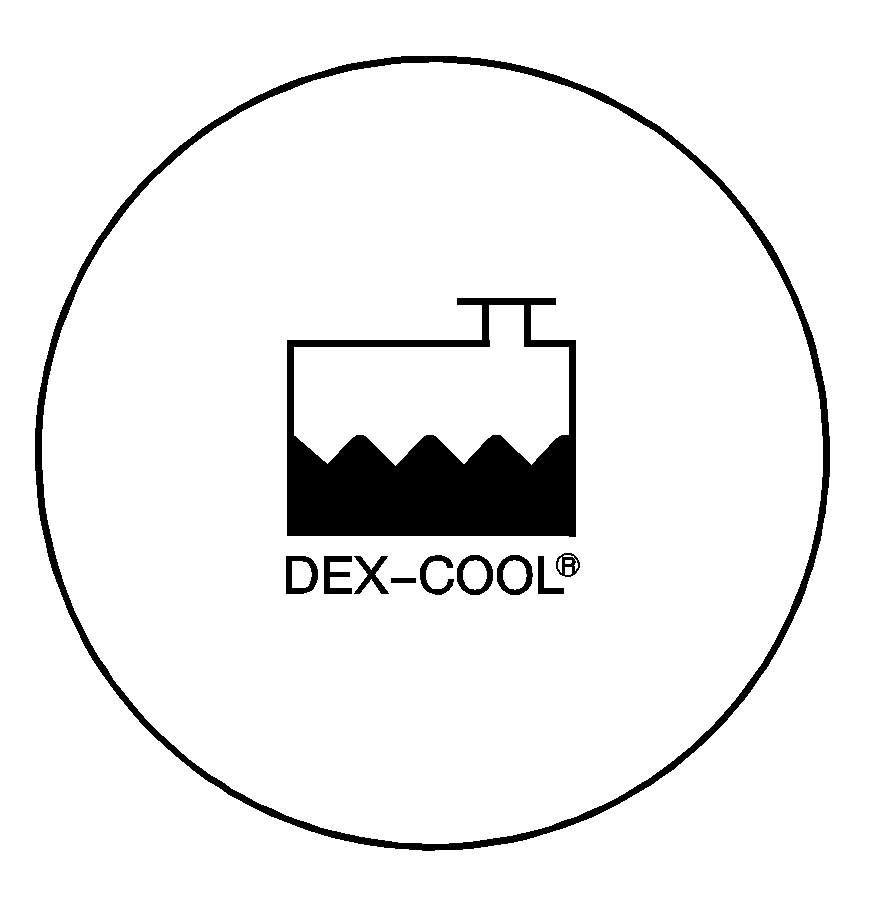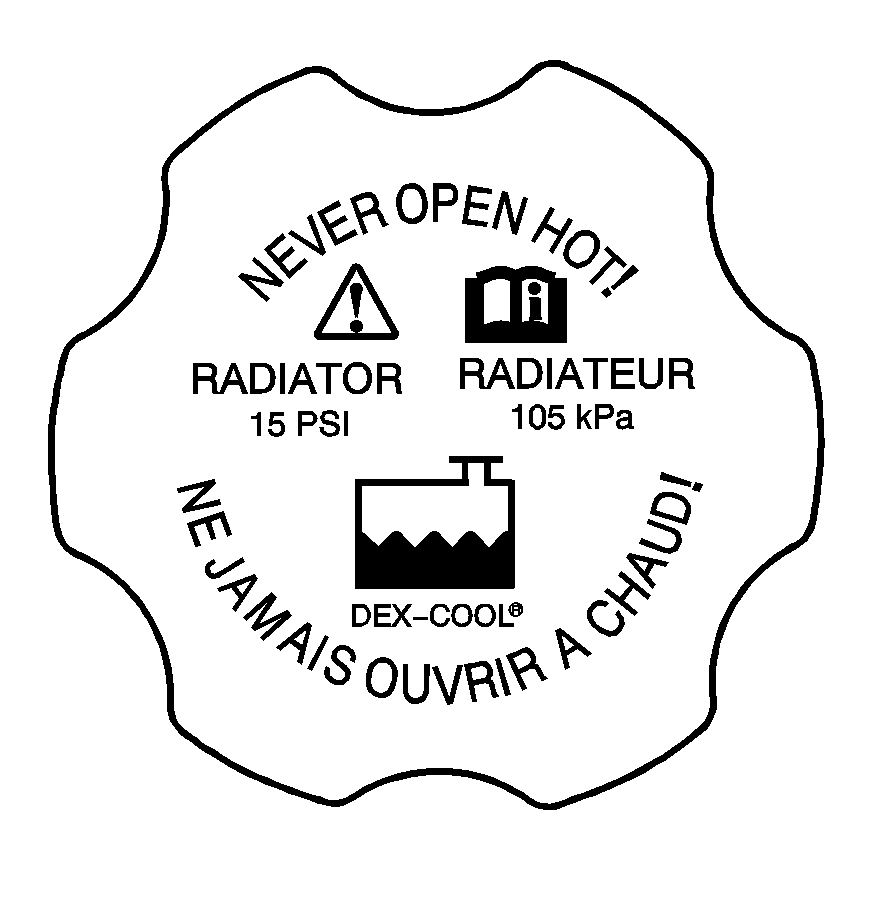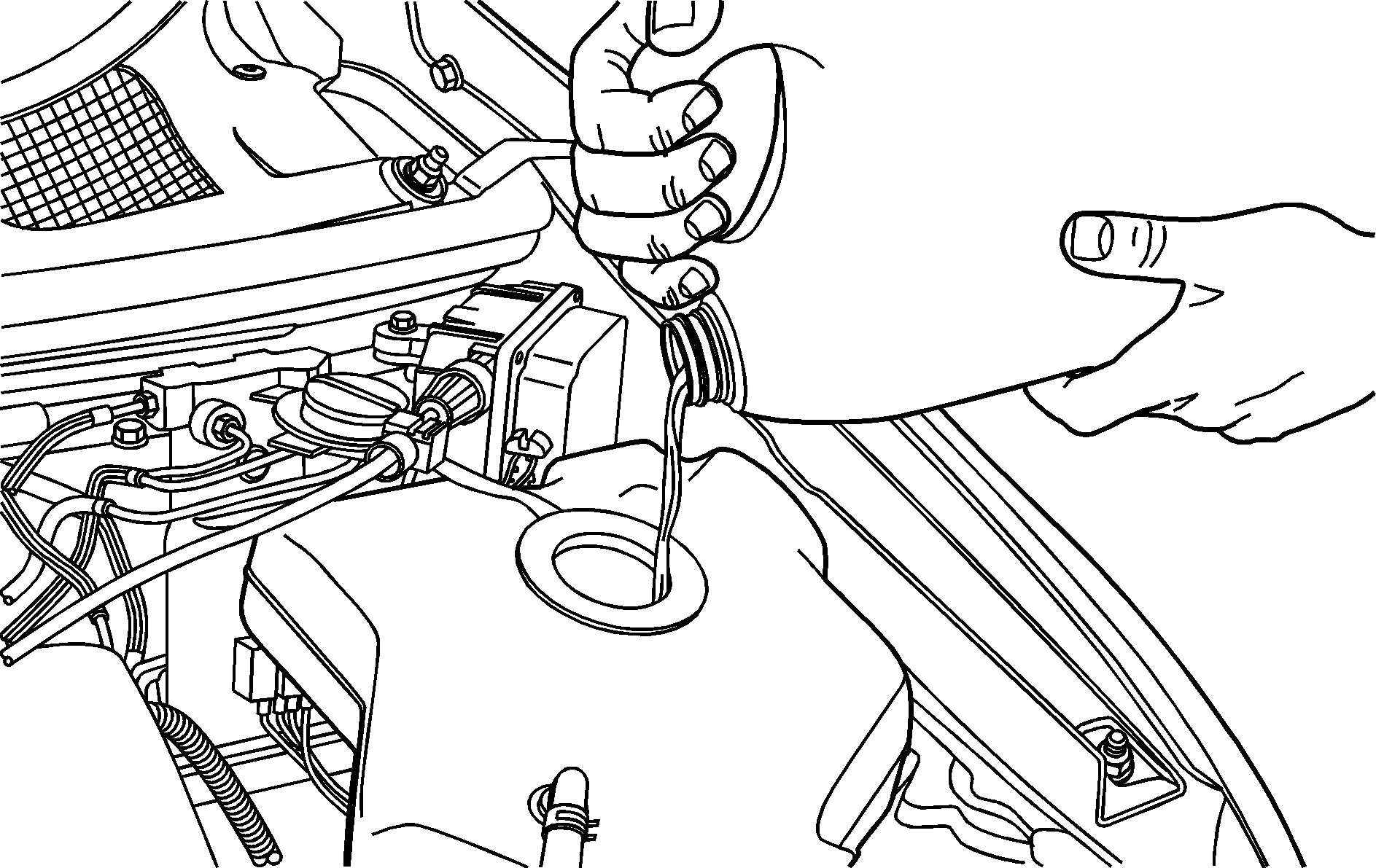The cooling system in the vehicle is filled with DEX-COOL® engine coolant. This coolant is designed to remain in the vehicle for five years or 150,000 miles (240 000 km), whichever occurs first.
The following explains the cooling system and how to check and add coolant when it is low. If there is a problem with engine overheating, see Engine Overheating
What to Use
Caution: Adding only plain water to the cooling system can be dangerous. Plain water, or some other liquid such as alcohol, can boil before the proper coolant mixture will. The vehicle's coolant warning system is set for the proper coolant mixture. With plain water or the wrong mixture, the engine could get too hot but you would not get the overheat warning. The engine could catch fire and you or others could be burned. Use a 50/50 mixture of clean, drinkable water and DEX-COOL® coolant.
Use a 50/50 mixture of clean, drinkable water and DEX-COOL® coolant. If using this mixture, nothing else needs to be added. This mixture:
| • | Gives freezing protection down to -34°F (-37°C), outside temperature. |
| • | Gives boiling protection up to 265°F (129°C), engine temperature. |
| • | Protects against rust and corrosion. |
| • | Will not damage aluminum parts. |
| • | Helps keep the proper engine temperature. |
Notice: If an improper coolant mixture is used, the engine could overheat and be badly damaged. The repair cost would not be covered by the vehicle warranty. Too much water in the mixture can freeze and crack the engine, radiator, heater core, and other parts.
Notice: If extra inhibitors and/or additives are used in the vehicle's cooling system, the vehicle could be damaged. Use only the proper mixture of the engine coolant listed in this manual for the cooling system. See Recommended Fluids and Lubricants for more information.
If coolant needs to be added more than four times a year, have the dealer/retailer check the cooling system.
Checking Coolant
The vehicle must be on a level surface when checking the coolant level.
Check to see if coolant is visible in the coolant recovery tank. If the coolant inside the coolant recovery tank is boiling, do not do anything else until it cools down. If coolant is visible but the coolant level is not at or above the full cold mark, add a 50/50 mixture of clean, drinkable water and DEX-COOL® coolant at the coolant recovery tank, but be sure the cooling system is cool before this is done. See Engine Coolant for more information.

The coolant recovery tank is located on the driver side of the vehicle, above the engine air cleaner/filter. See Engine Compartment Overview for more information on location.
When the engine is cold, the coolant level should be at the full cold mark, or a little higher. When the engine is hot, the level should be higher than the full cold mark. The full cold mark is a line with an arrow pointing down at it, located on the front of the coolant recovery tank.
When the engine is hot, the level could be higher than the full cold mark. If the coolant is below the full cold mark when the engine is hot, there could be a leak in the cooling system.
If the coolant is low, add the coolant or take the vehicle to a dealer/retailer for service.
How to Add Coolant to the Recovery Tank
Caution: You can be burned if you spill coolant on hot engine parts. Coolant contains ethylene glycol and it will burn if the engine parts are hot enough. Do not spill coolant on a hot engine.
Notice: This vehicle has a specific coolant fill procedure. Failure to follow this procedure could cause the engine to overheat and be severely damaged.
If coolant is needed, add the proper DEX-COOL® coolant mixture at the coolant recovery tank.
How to Add Coolant to the Radiator
Notice: Your engine has a specific radiator fill procedure. Failure to follow this procedure could cause your engine to overheat and be severely damaged.
Caution: An electric engine cooling fan under the hood can start up even when the engine is not running and can cause injury. Keep hands, clothing, and tools away from any underhood electric fan.
Caution: Steam and scalding liquids from a hot cooling system can blow out and burn you badly. They are under pressure, and if you turn the surge tank pressure cap -- even a little -- they can come out at high speed. Never turn the cap when the cooling system, including the surge tank pressure cap, is hot. Wait for the cooling system and surge tank pressure cap to cool if you ever have to turn the pressure cap.
If coolant is needed, add the proper mixture directly to the radiator, but be sure the cooling system is cool before this is done.
- Turn the pressure cap slowly counterclockwise. If a hiss is heard, wait for that to stop. A hiss means there is still some pressure left, close the cap and wait for the system to cool down.
- Keep turning the pressure cap. Remove the pressure cap.
- Fill the radiator with the proper DEX-COOL® coolant mixture, up to the base of the filler neck. See Engine Coolant for more information about the proper coolant mixture.
- Rinse or wipe any spilled coolant from the engine and the compartment.
- Start the engine and let it run until you can feel the upper radiator hose getting hot. Watch out for the engine cooling fans.
- By this time, the coolant level inside the radiator filler neck may be lower. If the level is lower, add more of the proper DEX-COOL® coolant mixture through the filler neck until the level reaches the base of the filler neck.
- Then replace the pressure cap. At any time during this procedure if coolant begins to flow out of the filler neck, reinstall the pressure cap. Be sure the pressure cap is closed properly.
- Then fill the coolant recovery tank to the full cold mark.
- Put the cap back on the coolant recovery tank.

Remove the radiator pressure cap when the cooling system, including the radiator pressure cap and upper radiator hose, is no longer hot.
Caution: You can be burned if you spill coolant on hot engine parts. Coolant contains ethylene glycol and it will burn if the engine parts are hot enough. Do not spill coolant on a hot engine.
Filling the Coolant Recovery Tank

Notice: If the pressure cap is not tightly installed, coolant loss and possible engine damage may occur. Be sure the cap is properly and tightly secured.
